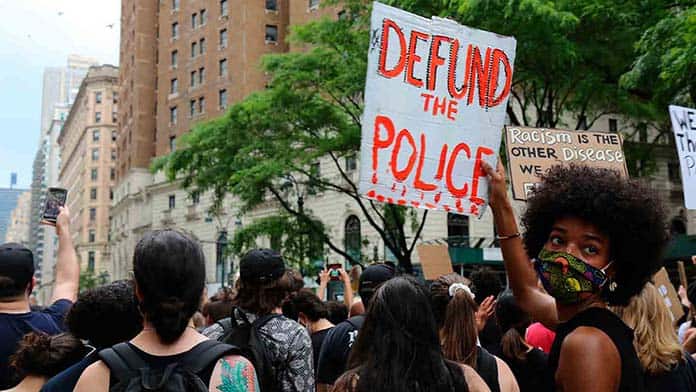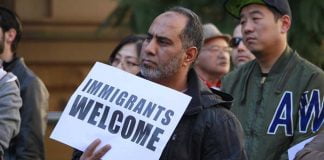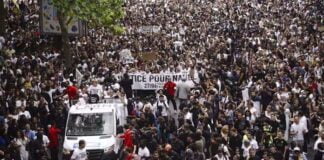One of the more radical demands to come out of the Black Lives Matter rebellion in the United States is the demand to “Defund the Police.”
It is a demand that has resonated with the multi-ethnic demonstrations in hundreds of cities among working class communities and the 40 million unemployed as a result of the COVID-19 lockdowns.
The demand also resonates in Australia where despite 438 Aboriginal deaths (since the Royal Commission into Black Deaths in custody in 1991) not a single police or prison officer has been convicted of any charge associated with the deaths.
Trump has vehemently opposed the demand to defund the police and is posing as the law and order presidential candidate. But Democratic Presidential nominee, Joe Biden, also rejected the demand, a position adopted after he raised proposals for police to be retrained “to shoot… in the leg instead of the heart”.
Bernie Sanders too, who spoke of socialism and a “political revolution” just months ago, has also rejected the demand, and is calling for increasing policing budgets at a time when the US spends twice as much on law and order (police, prisons and courts) than it does on social welfare.
Yet, the demand has already seen extraordinary developments. Los Angeles has announced it will cut up to $150 million out of the LA Police Department’s budget. Minnesota announced the divestment of on-campus police in higher education, and then later announced a plan to defund and dismantle the police department.
Seattle police have been driven out of a section of the city. Portland, Oregon announced plans to divert police funds to other programs.
One of the reasons that the defund demand has struck a chord is that, over many years, so many attempts to reform the police have failed—including in Minneapolis where George Floyd was murdered.
Alex Vitale, coordinator of the Policing and Social Justice Project at Brooklyn College explains, “In Minneapolis, five years ago, they fully embraced the idea that they could get out of their policing problem by having people sit around and talk about racism.
“They tried all these tactics to restore community trust in the police while at the same time the police were permitted to go on waging a war on drugs, a war on gangs, a war on crime, and criminalizing poverty and mental illness and homelessness… And five years later, it’s not better.”
Role of the police
To understand why efforts to reform the police fail, we need to understand the role of police in capitalist society. It’s not a matter of there being a few bad racist apples in the police force that can be weeded out.
The police are one part of the armed bodies of men (as Marx called them) that are part of the coercive apparatus of the capitalist state.
Their job is not to solve crimes. Ultimately policing is about protecting and maintaining a system of private property that allows oppression, exploitation and inequality to continue.
The reason the police are more violent and prejudiced than the rest of society is precisely because they reflect the attitudes and needs of the capitalist class.
Police in Australia were given extraordinary controls over the lives of Indigenous people in the 20th century, as “protectors” who could remove children, distribute rations and dictate movements. Hyper-surveillance of Indigenous communities never stopped.
Racist policing is also reinforced by economic marginalisation. A considerable amount of police time is spent in “proactive policing”, patrolling of poor neighbourhoods to supposedly deter crime. But they are really policing inequality and oppression.
As with Black people in the US, the poverty of Indigenous communities comes with extra police attention and this in turn hardens police racism. In Western Australia, Indigenous men represented 38 per cent of the male fine defaulter prison population, sent to jail for failing to pay fines for swearing, consuming alcohol or traffic offences.
Indigenous women made up 73 per cent of female defaulters.
Figures obtained by The Guardian showed that in NSW between 2013 and 2017 only 11.4 per cent of Indigenous Australians caught by police with small amounts of cannabis were issued cautions instead of a police charge, compared with 40 per cent of the non-Indigenous population.
Since their formation in the late eighteenth and early nineteenth century, police forces have been used to maintain regimes of colonialism and industrialization—to suppress resistance and revolts, and break picket lines and strikes.
Disarming the police and defunding them, to shift funds away from the police to provide housing, jobs and community services that people really need, would be a step forward.
But the racism of the police is part and parcel of the system they serve. To get rid of racist cops, we will need to abolish the police and the racist system that creates them.
By Ian Rintoul






